- Home
- Lisa Appignanesi
The Memory Man Page 3
The Memory Man Read online
Page 3
No, she was speculating wildly. In fact, apart from hearsay, she had no idea at what stage Professor Lind’s work on cognitive enhancers was.
So why did she feel she didn’t trust him? Couldn’t. Wouldn’t. Was it the seductive charm he had turned on her when he hailed her as his saviour as they waited to go into dinner? She was never at ease with that kind of charm, had in fact long schooled herself against it. It was the charm the older man deployed with the young woman, all teasing fondness and subtle persuasion. But she hadn’t been young for a long time, forever it sometimes seemed, and Bruno Lind could hardly be blind to the fact.
‘Ms Davies, Irena, may I call you that?’
She jumped back, surprised at his sudden appearance beside her, his hand on her shoulder.
‘Forgive me. You look a little lost. I thought perhaps I might introduce you to some of the confraternity. I know quite a few of them.’
‘That’s kind,’ she said, her tone too regal for her words. She bridled under the hint of patronage. That was it, she thought. This Lind was just a trifle pompous, full of himself. Urging the little Eastern European she was into the bright light of the Western day. They were all like that. When they were kind, that is. They wore that air of bestowing favours. Making lordly assumptions about what was for the best, when they had no idea. No idea about anything, really.
The chip on her shoulder, Irena noted, was in danger of metamorphosing into a millstone. She forced a gracious smile to her lips.
Lind introduced her to some colleagues – a Spaniard with an impossible accent, a handsome woman from Berlin and then to the Englishman who had stood in for him. Wood seemed to be a genial man, and the conversation bubbled and flowed. She envied the easy camaraderie amongst them, the liveliness. They had ready-made topics to hand, gossip about people she didn’t know, shared interests. Like members of some wandering community that regrouped whenever it met.
Lind had obviously caught her blank stare and was now trying to explain something about peptides to her and how a particular set of sequences Andrew Wood’s lab was working on could convert weak memories into stronger ones – and thus potentially be of use in preventing the full onslaught of Alzheimer’s disease.
‘Where are you attached to, Ms Davies?’ Wood addressed her directly for the first time.
‘No, no. You’ve misunderstood. I’m not attached to a lab. I’m a journalist.’
The temperature of the group seemed to drop a few notches. A wariness crept in.
‘With a London paper?’
Before she could answer, Aleksander Tarski came over to their group. He was balancing two cups of coffee, and he handed her one with a murmur.
‘I’m a freelance,’ she said softly, using the moment.
Lind took a step backwards as if he were on the verge of leaving them.
Trapped in the growing silence, Irena hastily filled it with introductions, babbled something about how she was writing a piece about the conference and in particular the Polish delegation.
‘Oh yes?’ Wood seemed to breathe easier. He engaged Tarski, whose English was remarkably good, in conversation. It turned out they had a friend in common in Warsaw, and she watched him navigate Tarski out of earshot to query him about his work. What was it she had overheard him say earlier? That he came to these meetings because you learned things in informal ways and without having to wait for what was at least the eight-month delay of publication, by which time an experiment could already have been disproved. Yes, that was interesting. Camaraderie married to competition. Sharing but with a level of secrecy.
She could still feel Lind’s disapproval. It seemed to have extended to the whole group. No, he wasn’t an easy man. He hadn’t taken in that she was a journalist before. Irena excused herself. She wanted another drink. But in a moment he was at her side again.
‘Shall we get a refill? They have decaf too, if you prefer. And petits fours. I’m afraid I’m greedy. I can never resist.’
It would have been rude to refuse. But she decided to challenge him and get it all out of the way. She had always preferred directness, though for much of her life it hadn’t been an option open to her.
‘You don’t approve of having journalists here?’
‘No, no. Not at all. It’s just useful to know who they are before… Well, let’s just say before anything gets mistranslated or hyped as miracle. Do you have a background in science?’
She chuckled. ‘So far in the background, you might say it has disappeared. I’m afraid my one distinct memory of a laboratory dates from schooldays and has more to do with the boy’s terrorizing the girls with Bunsen burners and blistering acid than with the subtlety of equations.’
‘I see.’ His tone was noncommittal, and she instantly regretted her frankness.
‘I did prepare myself, however. For this assignment. I did a lot of reading. And memory, you know… Well, it’s a subject that spans a great many disciplines, not all of them scientific – as the mayor so kindly reminded us this evening.’
‘Yes, yes, he did. An elegant cull of the dictionary of quotations, I thought. Including Roosevelt – Franklin D that is – from his address to the booksellers of America in 1942… Did you know it before?’ He put on a low but oracular voice. ‘“No man and no force can abolish memory. No man and no force can put thought in a concentration camp forever. No man and no force can take from the world the books that embody man’s eternal fight against tyranny of every kind.” And so on. Stirring stuff. Even now. Most particularly I imagine for officials in countries where a pretty good attempt was made at abolishing memory.’
‘Alzheimer’s abolishes it even more effectively.’ Irene muttered beneath her breath.
They had reached the long table on which the coffee pots stood at the ready in front of white-gloved waiters.
‘I’m sorry I didn’t quite hear you.’
‘Nothing. Nothing. I didn’t say anything.’
‘Yes, you did.’
He paused for a moment, assessing her from those wolf’s eyes. A Siberian wolf, she thought. He had a way with listening, did it with so much expression, that you would be forgiven for thinking he had spoken reams.
‘And which paper is it that you write for?’
‘Oh, I doubt that you’d know it.’
‘Try me.’
‘The Tygodnik Powszechny.’
‘Polish?’ He flashed an odd look at her.
‘Very good. Most wouldn’t even know that. It’s quite a famous weekly. It even played a role in bringing down the Communist regime.’
He didn’t reply. He was still staring at her.
‘So you’re really Polish? You write in Polish?’
‘I do. Is it a crime?’
‘No. But a surprise.’
She laughed. ‘What did you think?’
‘Well, to tell the truth, I thought you were English.’
‘Which means you’re not.’
‘Evidently.’
‘I did live there for many years.’
‘Oh?’
‘Yes. Almost twenty to be more or less exact.’
‘You can’t be more or less exact.’
‘About life, I imagine you can.’
He didn’t answer. He was sipping his coffee as if he had forgotten she was there. He was staring in the direction of Wood and Tarski. That suited her just fine, Irena decided. She chose the moment to offer some lame excuse and slip away.
But he was right. It had been a stupid thing to say. What had made her say it? As if she were about to engage on a confession. Was she flirting? Heaven forbid. No more men for her. A nun, that’s what she was. It’s what she had always wanted to be in a way. Even before she had left England. And Anthony had left her. Suddenly. With no warning. Not verbal in any event. All those years ago. Twelve to be exact. This time she could be. Could probably be even more exact than that if she concentrated for two seconds.
November 9, 1989. The day the Berlin Wall came down. It was nice to have world
historic events coincide with the merely personal dramas in one’s life. It gave a certain heft to things. Helped one to remember the date – which she would certainly have forgotten if it was simply a question of Anthony, his face a sullen mask above the wine-red scarf, walking out the yellow door of the Maida Vale flat and never again bothering to return. Except to collect two cases and three boxes containing the things she had packed for him as distinctly his.
Irena blinked to chase the rising tears from her eyes. Stupid woman. Still weeping. She chastised herself. He had called her that too. She had begun to lose her magic, it sometimes seemed to her, as Poland ceased to be a site of alien difficulty, of daily struggle against Communist odds. With its freedom she got hers. From Anthony in any case. She no longer needed saving.
Or maybe he just preferred younger skin.
She didn’t really know which version of events she favoured. Or indeed, which was closer to the truth. Or whether any of it mattered anymore. She had held on in London for quite a while without him, though the friends who had largely been his had begun to drop off or manifest too overtly how sorry they felt for her. Some urged her to hideous divorce proceedings and made her suspect they had all along been envious of Anthony and now wanted revenge through her. She had been too miserable for any of it and Anthony, in any event, had been generous enough. Financially, if not humanly. He may have lifted her out of her little Polish gutter, but he had no intention of dropping her back into it. He had too much pride for that – or maybe he just feared she would take the advice of his friendly enemies. Whatever the case, she was in no state to do anything, except perhaps fling herself out of the window into the common gardens at the rear. But she forced herself to carry on. And everyday she felt more bereft and more foreign.
Utterly alone, a bit of flotsam on the turbulent sea of London. Yet too proud to return to Poland divorced and beaten.
The work at the BBC Polish Service kept her busy, a semblance of life to keep the empty husk moving. There were articles for the Warsaw papers, too. More and more of them with the opening out to the West. But then her mother had needed her and she had decided to come home, though home was changing so rapidly, it wasn’t always easy to define it as familiar. Certainly, everything had changed in her own life.
Irena accepted a glass of brandy from a passing waiter. She downed it in a single gulp, revelling in the burn, and wove her way through small groups to hunt the man down for a second.
Yes, she had done a lot of burning in these last years. It filled her with a welcome aridity. But there always seemed to be more things to clear away. More and more to burn. This last quest of hers was a signal of nothing more than that.
Another few glasses and it too would probably disappear from the horizon, and she could fall into bed with a welcome emptiness all around her.
The breakfast room wore starched pink tablecloths, matched with napkins moulded into rigid cones. Its buffet gleamed with laden silver casseroles, interspersed with platters of fruit, cold meats, cheeses – more food than a bed-crumpled woman could bear to contemplate of a morning. Irena walked toward the far corner, nodding at any of the conference participants she had met, and found an empty table, a chair facing away from people. She ordered a pot of coffee, took out her pad and started to scribble some questions in preparation for the day. She was mad, she told herself. She should eat, be self-indulgent, enjoy her respite. For once, she was free of cares.
‘May I?’ Bruno Lind laid a hand on the chair opposite her.
Despite herself, she nodded politely. ‘Of course, Professor. How are you feeling today?’ He was balancing a bowl of muesli and a newspaper. The arrangement looked precarious.
‘Fine.’ He examined her. ‘You should drink two cups of warm water and then eat something sustaining before putting that caffeine into your system.’
She didn’t hide her surprise.
‘I know about these things. I’m a lot older than you. Go on. Go and get something for yourself.’
She went off like some slip of a girl. When she came back, his eyes were narrowed in anger.
‘Have you seen this?’ He jabbed at the newspaper and handed it to her.
‘I’m sorry. I don’t read German.’
‘You don’t need German to recognize the photograph of me. As for the rest, I’ll translate loosely. It says some garbage like the esteemed Professor Lind suffered an accident yesterday on his way to the Freud Museum, home of his precursor in the field of neurology.’
‘I didn’t talk to anyone. I didn’t. How dare you suggest that…?’
‘Didn’t you? Who talked to them, then? And it gets worse, if that’s possible. “The Professor, who is here for a conference on memory and blah, blah, might have wanted to set eyes on his childhood home, not so far from his predecessor’s. In fact, perhaps he has returned to Vienna in order to lodge a claim for restitution against the city, take memory to court. The theft of an apartment, certainly – and there may be more, an art collection to equal the contested Rieger horde, extracted by the Nazi state when the family left the city. Professor Lind’s father was a well-known social democrat…”’
‘Is all this true?’ She stared at him.
‘If it were true, would I be sitting here fuming, finding my breakfast impossible to digest?’
‘So it’s not true?’
‘It’s a mixture of truth and lies of the kind your colleagues are so good at serving up. An ignorant and offensive mishmash. An invasion of privacy.’
His forehead had grown warm with perspiration. Irena suddenly felt frightened for him. ‘Don’t let it get to you,’ she reassured. ‘It’s just insinuation. I promise you I had nothing to do with it. All I did was tell the convenors that you were in hospital. After that…well, it’s not very difficult for some reporter to put two and two together and get five.’
‘It makes me so angry, I could lodge a claim out of sheer rage.’
‘That’s why most people do it.’
‘Current rage. Not past rage.’
‘A claim against the press, then. Which bits fit the facts?’
‘The childhood home. I don’t know about any picture collection. Maybe there was one.’ He grumbled. ‘It’s the tone. It makes everything meaningless. And my father never left the country.’
There was something in his face that didn’t let her press further. He was a man, she thought, who was probably good at rage, though had learned to contain it, maybe deflect it. She sipped her coffee and stirred some honey into the yoghurt she had selected as looking least indigestible.
‘Will you be going to any of the conference sessions today?’ she asked to change the subject.
He didn’t answer, and she let the silence grow. It grew so thick that she was relieved at Aleksander Tarski’s approach. She remembered now that in a garrulous moment – or was it because she was thinking of her article? – she had suggested they breakfast together. She gestured him to the seat beside her, moved away the cone of a napkin so that he could deposit his plate.
‘You have met, haven’t you?’ she said for lack of anything better.
‘Yes, yes. And I had hoped for a quiet moment with you, Professor Lind.’ Tarski’s voice dipped, polite with Polish formality over the ‘Professor’. ‘I don’t know if you had a chance to look at the offprint I sent you, the one I wrote for the British Neurological Journal, four maybe five months ago.’
‘You sent me something? With your name on it?’ Lind gave the man a stare that was almost rude with doubt. ‘No, no. I don’t remember receiving it. You’re certain?’
Irena intervened. ‘Professor Tarski works on cytokines, their role as messengers between immune and inflammatory cells and looks at how they modulate brain activity.’
Tarski gave her an encouraging smile as if he didn’t quite believe her flow of science. ‘Yes, we’re interested in Il-1, Il-6 and TNF, the tumour necrosis factor, and how they contribute to amyloid deposition and tissue destruction in the formation of Alzheimer plaques.
’
‘Oh yes?’ Lind’s demeanour was less suspicious now. ‘And how do they?’
After a few minutes, Irena noted, Lind began to wax enthusiastic, and Tarski was gradually transformed, as if the older man’s enthusiasm, slow to be roused, acted as a tonic, stirring the younger one’s face, his mind, even his body, which now seemed more erect, more vigorous. Irena watched, rapt. It was like watching a mental infusion of some magical elixir or the charge of an electric rod. With the new intensity in his face, Tarski had suddenly been turned into an attractive man. Was this what people meant when they talked about ‘so-and-so’s’ particular brilliance at heading a lab, at getting the best out of their post-docs, that slew of younger researchers who seemed to move round the world like an elite corps of scientific backpackers, sussing out through some impenetrable grapevine which beach or lab was the perfect one for them.
She wished that Lind could infuse her with some of his energy. Not that it would necessarily help her penetrate the arcane matter they were now talking about. If she had come here with the veiled hope that she might learn something that would help her deal with her mother, she was fast giving up on the notion. There was a Gobi of blinding sandstorms and unquenchable thirst to cross between these brain scientists’ descriptions and her mother’s experience, let alone her own, of the slow sadistic killer that Alzheimer’s disease was. Would understanding the nature of a cytokine or the biochemical workings of a memory cascade explain why her mother too often insisted Irena was someone quite other than Irena, someone she called out to with love in her voice, only moments later to sit frozen in terror in the armchair she was increasingly reluctant to leave? Could anything visible only through an electron microscope at a ten-thousand time magnification tell her why, when her mother occasionally blundered out of the building, she would lose herself on a street she had walked on daily for too many years, while she could describe in minute and repetitive detail the night of Irena’s birth in a small town hundreds of kilometres away, the name of the midwife, the birds and flowers she had listed so as to mute the pain of the labour – names she still chanted with parallel and rising urgency? Would anything gleaned at this conference help her deal with her mother’s sudden rages, so vicious that she felt reduced to pulp when they were over? She doubted it.

 Memory and Desire
Memory and Desire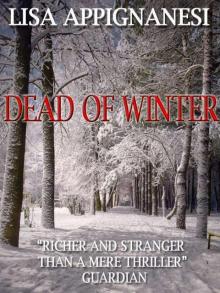 The Dead of Winter
The Dead of Winter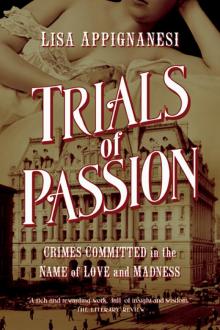 Trials of Passion
Trials of Passion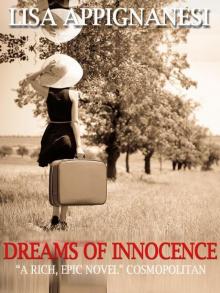 Dreams of Innocence
Dreams of Innocence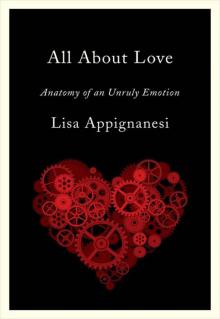 All About Love: Anatomy of an Unruly Emotion
All About Love: Anatomy of an Unruly Emotion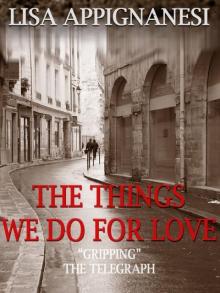 The Things We Do For Love
The Things We Do For Love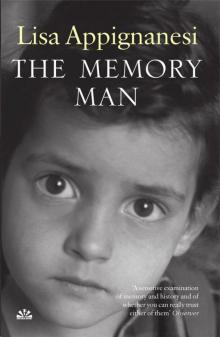 The Memory Man
The Memory Man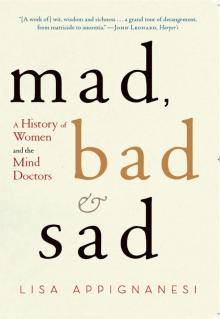 Mad, Bad, and Sad: A History of Women and the Mind Doctors
Mad, Bad, and Sad: A History of Women and the Mind Doctors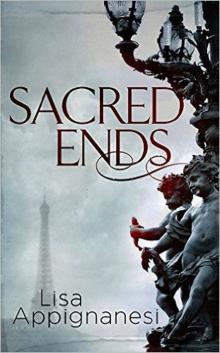 Sacred Ends
Sacred Ends Paris Requiem
Paris Requiem Sanctuary
Sanctuary A Good Woman
A Good Woman